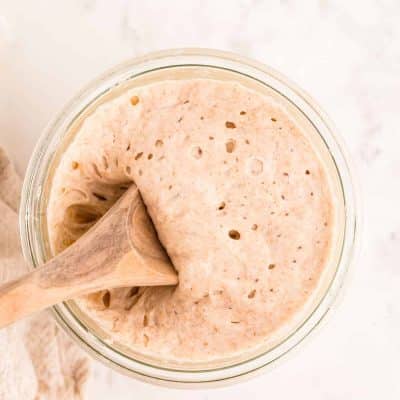
Sourdough Starter
Servings 1 starter

Sourdough Starter has step-by-step instructions with photos to easily help you make the starter for all of your favorite sourdough recipes! Only takes 10 minutes twice a day to feed!
Ingredients
- 400 grams Whole wheat or whole rye flour
- 800 grams Filtered water
- 300 grams All-purpose flour
Instructions
- Day 1: In a small bowl, combine 100 grams whole wheat flour and 100 grams of filtered water. Stir together until an even paste forms. Cover with plastic wrap and set in a warm room temperature, draft-free location.400 grams Whole wheat or whole rye flour, 800 grams Filtered water
- Day 2: After 24 hours, stir the mixture. Remove 100 grams of the mixture to a clean container. To it, add 100 grams of all-purpose OR whole wheat flour and 100 grams of water. Stir, cover, and return to warm location for another 24 hours. Discard excess starter.300 grams All-purpose flour
- Day 3: You should begin to see signs of fermentation on day 3 - bubbles, a slight aroma. Begin feedings twice a day once you see signs of fermentation. Measure 100 grams of the starter mixture into a clean jar (choose a container with enough room for mixture to at least double). Add 100 grams of flour (I typically do a combination of 50g all-purpose, 50g whole wheat) and 100 grams of filtered water. Discard the extra starter or use in discard recipes. Repeat this process every 12 hours.
- Day 4 and beyond: Continue with feedings every 12 hours. Measure out a portion of your starter and feed with equal amounts of flour and water.
- After 1-2 weeks, the mixture should begin doubling after about 6-8 hours. When the starter is doubling in 6-8 hours regularly with large bubbles throughout the whole mixture, it is ready to use in bread.
Notes
- I started using a tall glass jar with straight sides so that I could mark a line on the outside of the jar with a dry-erase marker and then track how much the mixture was rising throughout the 12 hours between feedings.
- You should start to notice a regular pattern. The starter is thick when first mixed, it loosens and starts to have some bubbles on the surface after 2-3 hours. Then the starter bubbles and rises in the jar. It should be doubling in height at the 6-8 hour mark. From hours 8-12, the mixture continues to be bubbly, but will start to cave in at the top and decrease in height. At 12 hours, the mixture is “hungry” and less active and is ready to be fed.
- USE FILTERED WATER. The chlorine in city tap water can kill the yeast and decrease or completely prevent fermentation. I buy inexpensive distilled water by the gallon and use that. Over time, the starter may become strong and stable enough that it can withstand tap water, but proceed with caution.
- Whole wheat or whole rye flour is best to get the starter going. After the initial fermentation starts, I switched over to half all-purpose and half whole wheat for every feeding and that seemed to do great.
- I used 100 grams to keep things nice and even and easy to measure and easy to multiply. 100 grams of each starter, water, flour for every feeding. You can adjust this however you like - just make sure you’re measuring out even weights of starter, water, flour. I’m now maintaining at 50 grams. 50 grams starter, 50 flour, 50 water and keeping the starter on the countertop.
- If you don’t want to keep feeding the starter every 12 hours, you can give it a feeding, let it sit out for a few hours to get bubbly, and then store it in the refrigerator. Feed refrigerated starter once a week the same way. When you want to make bread, pull the starter out of the fridge, give it a feeding, and then wait at least 8 hours to get active before removing the amount needed for your bread.
- Some people provide cup measurements, for example ½ cup starter, 1 cup flour, ½ cup water. I really think that if you’re going to invest the time in making sourdough starter and bread, that you should invest in a scale so that you know precisely what you’re adding at all times. Much more reliable.
Nutrition
Calories: 303kcal | Carbohydrates: 64g | Protein: 11g | Fat: 1g | Saturated Fat: 0.1g | Polyunsaturated Fat: 0.2g | Monounsaturated Fat: 0.03g | Sodium: 6mg | Potassium: 95mg | Fiber: 6g | Sugar: 0.1g | Calcium: 42mg | Iron: 3mg
Find it online: www.sugarandsoul.co/how-to-make-a-sourdough-starter/